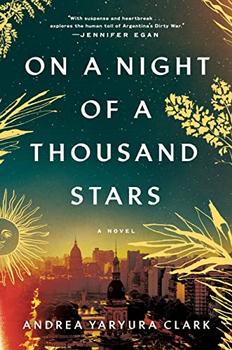Book Club Discussion Questions
Want to participate in our book club? Join BookBrowse and get free books to discuss!
Please be aware that this discussion guide will contain spoilers!
- The novel alternates between the perspectives of Paloma in 1998 and Valentina in 1973. What parallels did you draw between both characters' lives in terms of passion and personality? Did you prefer one timeline to the other?
- In the first half of the novel, we see the gradual erosion of civil liberties in Argentina, such as the elimination of the free press, the acceleration of arrests, and the state's sponsorship of the Argentine Anticommunist Alliance. How did these changes lay the foundation for the atrocities that were later committed by the dictatorship? Were you familiar with Argentina's "Dirty War" before reading On a Night of a Thousand Stars? How did reading about these events affect you?
- HIJOS, The Sons and Daughters for Identity and Justice Against Oblivion and Silence, and the Madres and Abuelas de Plaza de Mayo, Mothers and Grandmothers of the Plaza de Mayo, were formed to expose the human rights violations committed during the dictatorship, and overturn the regime's mandate of Silence Is Health. "The only course of action was for us to become activists," said Franco in Chapter Twenty-One. "Our mission is to reveal the truth. We won't remain silent and let our country continue to bury its past." What would it mean to dedicate your life to a cause with so few answers and so much pain? How do groups like HIJOS support and protect one another while pursuing such difficult work?
- In Chapter Nine, Paloma meets Martín Torres, a professor at the University of Buenos Aires. He is one of the many people Paloma's father, Santiago, helped to flee the country in the 1970s. Torres tells Paloma about Argentina's democratic election in 1983, when Raúl Alfonsín was elected president: "Many decided to stay in their adopted countries. Those who came back to Argentina soon understood that living in exile had changed them in ways they hadn't foreseen. They would remain foreigners when they returned to their homeland." In light of this statement, why do you believe Martín Torres called his first book "Death by Exile"? How else does the theme of displacement present itself in the novel?
- As an architect, Valentina's greatest desire was to provide affordable housing, as she believed everyone had the right to adequate shelter. How else did Valentina's creative and professional aspirations reflect her social and political leanings?
- In Chapter Eighteen, the nuns look benevolently upon Valentina and Máximo, "seeing something of themselves in these young people's desire to improve the world, if only with small actions." In your own life, how have small actions led to big changes? How have young people in recent generations worked together to bring about a better world?
- Could you find any similarities between Santiago, Máximo, and Franco's aspirations for Argentina? Where did their dreams for their country overlap—and where did their worldviews diverge? How did Franco's Argentina differ from Santiago and Máximo's?
- In Chapter Twenty-Two, Valentina decides to commit to her relationship with Máximo and end her affair with Santiago. In his sadness, Santiago concedes that the two are a more "natural fit" for one another because of their passionate desire to help the poor and shared socio-economic background. Do you agree or disagree with Santiago's assessment here? What do you believe is most important when it comes to cultivating and sustaining romantic love?
- In Chapter Twenty-Five, at the pizzeria with Franco, Paloma admits that she feels more at home in Argentina than she does in New York, despite being born and raised in the city. Franco replies: "Your heritage is in you. You can't change who you are just by being born somewhere else." Discuss the sense of home and homeland in the novel and the benefits and disadvantages of being raised in two cultures. How much does a physical place—or the absence of it—characterize a person?
- The lives of so many characters in the novel are defined by events that transpired under the dictatorship. Have any world events played a defining role in your life? Are you generally influenced by politics?
- How did learning of Santiago's revolutionary leanings change Paloma's preconceptions of her father? Have you ever learned something about a parent that changed your understanding of who they are—and who you are by extension?
- Family, both biological and chosen, is an important theme in On a Night of a Thousand Stars. In your opinion, what is it, exactly, that makes someone family? Is it blood? Marriage? The choice to share your life with someone? How would you cope with the destabilization of your family unit, as Paloma did?
- In the Epilogue, Franco tells Paloma that their mothers spent their final days at the same concentration camp, a notion that comforts them both. Do you believe in destiny or coincidence? Have you ever felt like a greater force has been at play in your own life?
Download the full Book Club kit, including topics, Q&A and recipes!
Unless otherwise stated, this discussion guide is reprinted with the permission of Grand Central Publishing. Any page references refer to a USA edition of the book, usually the trade paperback version, and may vary in other editions.
